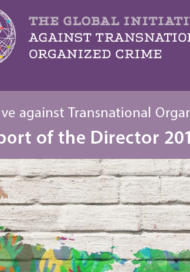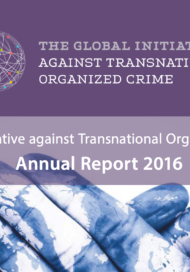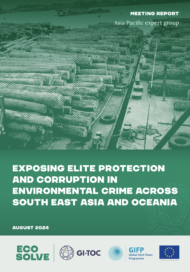Posted on 17 Mar 2016
This report provides an overview of the activities undertaken by the Global Initiative over the course of the year, and attempts to highlight some of the achievements and impact that the Global Initiative could be said to have had over the past year.
2015 has been an important year for the organisation, as arguably it is the one in which we moved from the “transition phase” of a start-up operation, into one that was functioning in full. A number of key milestones marked the end of this transition: firstly, we appointed and had the first meeting of the Advisory Board of the Global Initiative; staff were recruited to the Secretariat on a full-time basis for the first time, and the Global Initiative Network of Experts (GIN) exceeded 100 members. This being said, however, the Global Initiative is still a very new organisation, and this year has been one of rapid evolution and learning – learning how we can add value, constantly outreaching and connecting with new partners and in new areas, building a team of staff and working on building a sustained and predictable funding base. These are, realistically, likely to be considerations for a number of years to come.
In just this short time, the Global Initiative has reached a degree of brand recognition, which I think has exceeded the expectations of all who have been involved with us. Our work on migrant smuggling markets, on the environment and wildlife crime and on illicit financial flows in West Africa have brought unprecedented levels of recognition both in the media and in the policymaking world, and this has helped to attract new membership and build a stronger platform on which to project our growing body of work.
2015 has been a year which has marked some significant policy shifts that will change the way that development actors will engage with organized crime programming. The adoption of the 2030 Agenda for Sustainable Development (ASD2030) by the General Assembly on the 25 September 2015 places the issue of organized crime firmly within the realm and mandate of development actors. Clarifications on the rules for recording development assistance contributions under the revised Financing for Development framework and the clarification of the ODA rules will make it easier for development actors to engage in programming directly related to tackling organized crime, mitigating its impact and building the resilience of communities to criminal flows. In the the year to come, United Nations General Assembly Special Session on Drugs (UNGASS) this will shine a spotlight on the debates around what are the appropriate responses to transnational organized crime, and how we achieve balanced, integrated approach that can include both criminal justice, security and development responses.
We have been very privileged to partner with the OECD in thinking through their approaches, as one of the foremost policy-setting bodies for the development community, and look forward to taking this further forward in the year to come. The development of integrated approaches to organised crime was an issue which was fundamental to the founding of the Global Initiative, and an area where we have been actively engaged with development donors since 2013. In the year to come, we hope to be able to more significantly advance this work, and develop tools and monitoring capacity to strengthen development cooperation to both respond to organized crime directly, and to mitigate its most deleterious impact.




